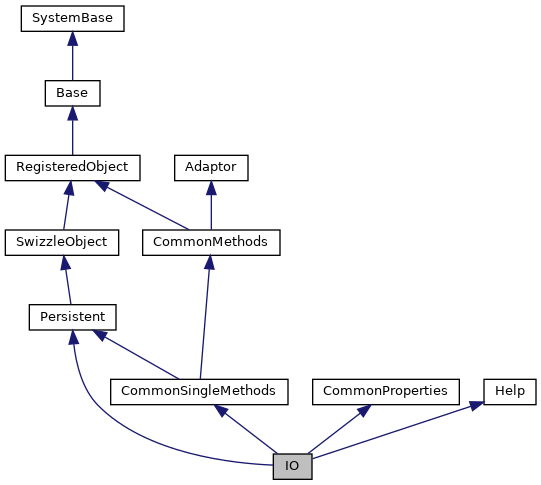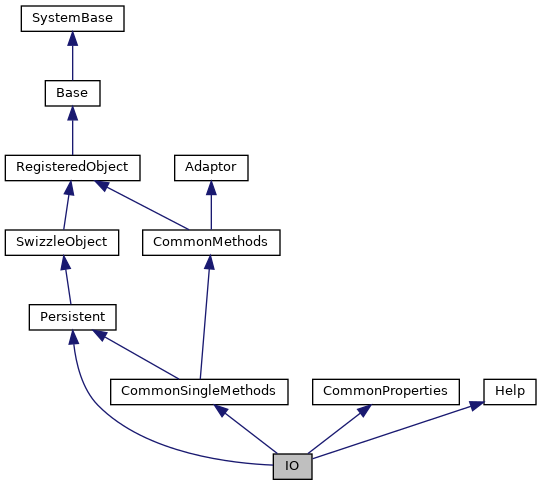This class allows you to modify and view the [IO] section of the CPF file through programatic APIs. More...


Public Attributes | |
| File | |
| Routine to use in WRITE commands for sequential files. More... | |
| MagTape | |
| Routine to use in WRITE commands for magnetic tapes. More... | |
| Other | |
| Routine to use in WRITE commands for Other devices. More... | |
| Terminal | |
| Routine to use in WRITE commands for terminals. More... | |
 Public Attributes inherited from CommonProperties Public Attributes inherited from CommonProperties | |
| CPFFile | |
| CPF file which the object maps to. More... | |
| Comments | |
| Embedded comments in the CPF file. More... | |
| Flags | |
| Flags governing how the object is processed when Save() is called. More... | |
| Name | |
| Name of the object instance. More... | |
Additional Inherited Members | |
 Static Public Member Functions inherited from CommonSingleMethods Static Public Member Functions inherited from CommonSingleMethods | |
| _.Library.Status | Get (_.Library.String Properties, _.Library.String CPFFile, _.Library.Integer Flags) |
| Get a sections properties from a CPF file. More... | |
| _.Library.Status | GetList (_.Library.String CPFFile, _.Library.Integer Flags) |
| Returns the properties from a section in a CPF file by value in $list format More... | |
| _.Library.Status | Modify (_.Library.String Properties, _.Library.String CPFFile, _.Library.Integer Flags) |
| Modify a sections properties in a CPF file. More... | |
| _.Library.ObjectHandle | Open (_.Library.String CPFFile, _.Library.Integer concurrency, _.Library.Status Status, _.Library.Integer Flags) |
| Open an instance of an section object in a CPF file. More... | |
 Static Public Attributes inherited from CommonProperties Static Public Attributes inherited from CommonProperties | |
| DOMAIN = None | |
| This class contains properties which are included by classes which manipulate sections in the CPF file. More... | |
This class allows you to modify and view the [IO] section of the CPF file through programatic APIs.
While properties are usually modified through the System Management portal, there may be some occasion where modifying them through the API's is best for your system. In all the Config methods, if you do not specify the CPFFile parameter, the currently active CPF file is used. If you wish to modify a CPF file which is not the currently active one, then specify the CPFFile you wish to modify in the method call.
The Flags parameter does not normally need to be specified; the defaults are usually sufficient for most cases.
You can use either the provided API's (Get/Modify) to modify the properties by passing in the correct parameters, or use Object syntax to open and directly manipulate the config objects.
EXAMPLE:
; Use class methods to modify properties
SYS>s Status=##Class(Config.IO).Get(.Properties)
SYS>i 'Status w !,"Error="_$SYSTEM.Status.GetErrorText(Status)
SYS>zw Properties
Properties("File")="^%X364"
Properties("MagTape")="^%XMAG"
Properties("Other")="^%X364"
Properties("Terminal")="^%X364"
STS>s Properties("Terminal")="^%XMYROUTINE"
SYS>s Status=##Class(Config.IO).Modify(.Properties)
SYS>i 'Status w !,"Error="_$SYSTEM.Status.GetErrorText(Status)
; Now use Objects to modify properties
SYS>s Obj=##Class(Config.IO).Open()
SYS>w Obj.Terminal
^XMYROUTINE
SYS>s Obj.Terminal=^ZMYROUTINE
SYS>s Status=Obj.Save()
SYS>i 'Status w !,"Error="_$SYSTEM.Status.GetErrorText(Status)
| File |
Routine to use in WRITE commands for sequential files.
| MagTape |
Routine to use in WRITE commands for magnetic tapes.
| Other |
Routine to use in WRITE commands for Other devices.
| Terminal |
Routine to use in WRITE commands for terminals.